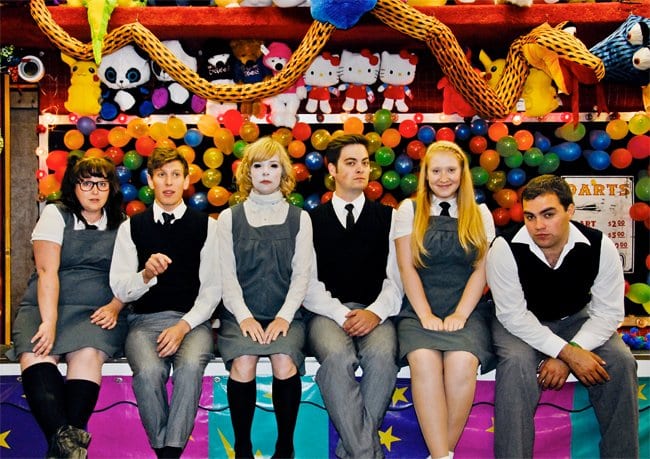If Jacob Richmond did not exist, it would be necessary for Canadian theatre to invent him.
Anyone fortunate enough to spend any time in his idiosyncratic world will surely agree. This goes especially for those lucky enough to catch a performance of his musical, Ride the Cyclone, opening again in Vancouver on Jan 17.
Canadian audiences know Richmond’s wit from previous productions, including Legoland in 2008 and Small Returns in 2004. He is also co-founder of Atomic Vaudeville, a Victoria, BC, performance company he founded in 2005 with director Britt Small.
The company plays to standing-room crowds as a kind of subversive counter-culture voice to its oft-stuffy home city. It has developed a loyal stable of performers and an audience of widely ranging ages and socioeconomic backgrounds. It’s an arrangement any artistic director would kill for.
Ride the Cyclone follows Legoland as the second part of a trilogy set in Uranium, Saskatchewan. The play, which toured Canada in 2011, explores the mythos of the small Canadian town slowly swallowed by big-box capitalism.
In Ride the Cyclone, a repentant fortune-telling machine serves as emcee for the final performance of the Choir of St Casian’s Catholic School, whose members perished in the wreck of the titular roller coaster.
Perhaps the mass appeal of Ride the Cyclone comes from the rare intersection of pathos and bathos; truly hilarious satire is presented with a musical-comedy sheen, razor-wire edge and open heart.
Richmond says the play is so successful because it engages audiences on many levels. His characters, he says, have deep roots. “It’s not just one-liner, one-liner, one-liner.”
To illustrate his point, Richmond invokes one of the piece’s most sublime moments. It comes when shy Ricky Potts, garbed in a disco-fabulous spandex bodysuit, belts out the Bowie-esque “Space Age Bachelor Man.”
Ricky “fantasizes about making love to giant cat women, but he really means it, he really feels it,” Richmond says. This collision of authentic emotion and broad pastiche “is really the art of camp . . . when it’s done well.” And in the case of Ride the Cyclone, it is done very well indeed.
Somewhere Susan Sontag is wearing a wide smile.

 Why you can trust Xtra
Why you can trust Xtra


